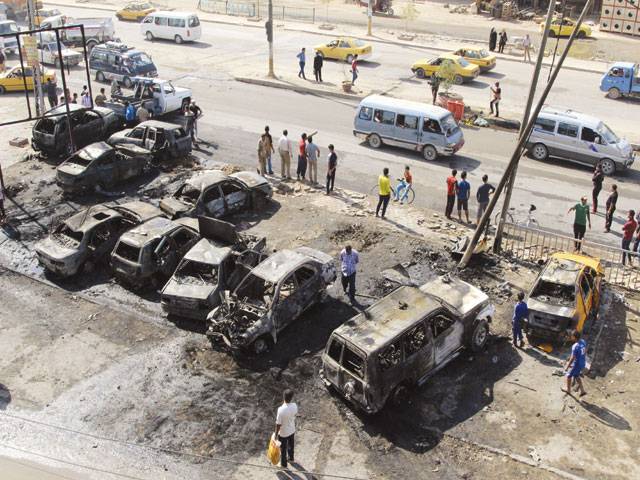BAGHDAD - Ten bombings mainly targeting Shia-majority areas of Baghdad province killed at least 41 people on Sunday, while 24 died in other attacks in Iraq, officials said.
The attacks are the latest in a surge in violence that has killed over 650 people so far this month, and more than 5,350 this year.
The 10 blasts, which hit nine different areas in and around Baghdad, also wounded more than 110 people, security and medical officials said.
One of the worst-hit neighbourhoods was Shaab in north Baghdad, where two car bombs exploded in a commercial area, killing at least eight people and wounding at least 18.
Blasts also struck the areas of Bayaa, Baladiyat, Mashtal, Hurriyah and Dura in Baghdad, and Saba al-Bur, Nahrawan and Tarmiyah near the capital.
The Mashtal blast hit a bus station while bombs in Bayaa, Dura, Saba al-Bur and Tarmiyah targeted commercial areas.
And south of Baghdad, three mortar rounds struck houses in the Shia-majority Jaara area, killing at least three people and wounding at least eight.
Sunni militants often carry out attacks against members of Iraq's Shia majority, whom they consider apostates.
Iraq has since last month restricted many Baghdad residents to using their cars only every other day, but the measure has failed to prevent dozens of vehicle bombs exploding in the capital.
In the northern city of Mosul, a car bomb targeting soldiers waiting outside a bank to collect their wages killed at least 14 people, among them three soldiers, and wounded more than 30 people.
Unknown gunmen also shot dead two soldiers and a civilian in two separate attacks in Mosul, while a car bomb exploded near an army checkpoint in the city, killing a woman and wounding eight people.
And gunmen killed two Shia civilians in the Muqdadiyah area, northeast of the city of Baquba, while a tribal leader was killed by a magnetic "sticky bomb" on his vehicle in the same area.
Violence in Iraq has reached a level not seen since 2008, when the country was just emerging from a brutal sectarian conflict.
The surge in bloodshed this year, which has included sectarian attacks, has raised fears Iraq may relapse into the intense Sunni-Shia conflict that peaked in 2006-2007 and killed tens of thousands of people.
Analysts say the Shiite-led government's failure to address grievances of the Sunni Arab minority, which complains of political exclusion and abuses by security forces, has been a main cause of the heightened unrest.
The level of violence rose sharply after security forces stormed a Sunni protest camp in northern Iraq in April, sparking clashes in which dozens died.
And while authorities have made some concessions aimed at placating the protesters and Sunnis in general, such as freeing prisoners and raising the salaries of Sunni anti-Al-Qaeda fighters, the underlying issues remain unaddressed.
More than 650 people have been killed so far this month, and over 5,350 since the beginning of the year, according to AFP figures based on security and medical sources.
A study released this month by academics based in the United States, Canada and Iraq said nearly half a million people have died from war-related causes in Iraq since the US-led invasion of 2003.
In addition to major security problems, the Iraqi government has failed to provide adequate basic services such as electricity and clean water, and corruption is widespread.
Political squabbling has paralysed the government, while parliament has passed almost no major legislation in years.
Saturday, April 20, 2024
Spate of attacks kills 65 in Iraq

12:54 PM | April 20, 2024
Heavy rains claim 98 lives, 89 injuries, across Pakistan: NDMA
1:21 PM | April 20, 2024
Watercourse project to help increase crop yields in Punjab
12:57 PM | April 20, 2024
Justice Ishtiaq Ibrahim sworn in as PHC chief justice
12:54 PM | April 20, 2024
Policitising Tragedy
April 20, 2024
Tehran to Rafah
April 20, 2024
A New Leaf
April 20, 2024
A Tense Neighbourhood
April 19, 2024
Dubai Underwater
April 19, 2024
Dangers of Deepfakes
April 20, 2024
Feudalism
April 20, 2024
Kite tragedy
April 19, 2024
Discipline dilemma
April 19, 2024
Urgent plea
April 19, 2024
ePaper - Nawaiwaqt
Advertisement
Nawaiwaqt Group | Copyright © 2024





